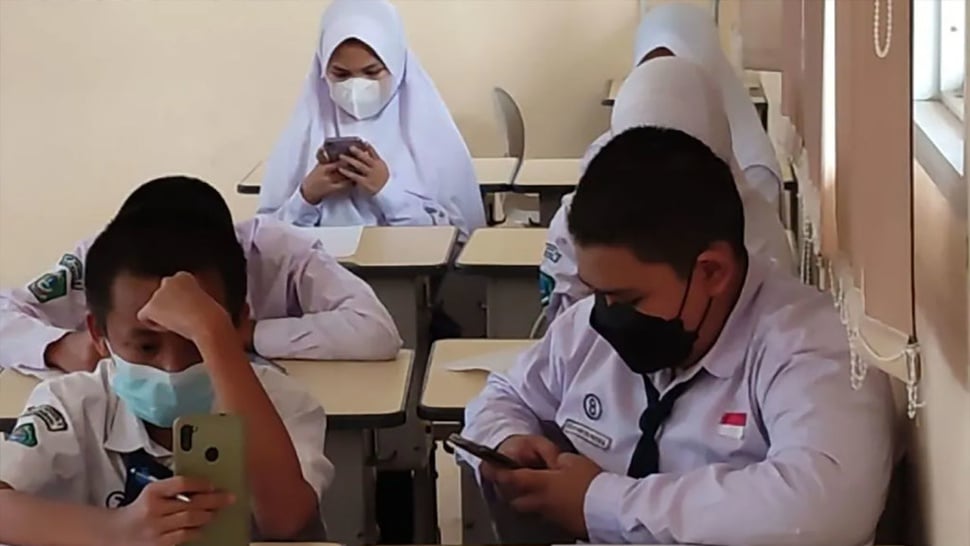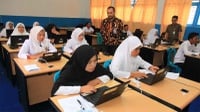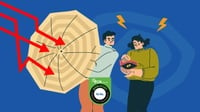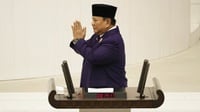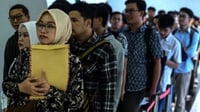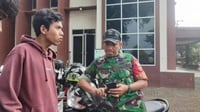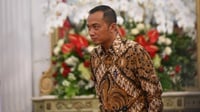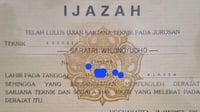tirto.id - Soal PTS Bahasa Inggris Kelas 8 semester 2 Kurikulum Merdeka di artikel ini merupakan contoh pertanyaan yang bisa menjadi bahan belajar siswa jelang ujian tengah semester (PTS atau UTS). Selain menguji kemampuan siswa, contoh soal PTS kelas 8 semester 2 Bahasa Inggris ini dapat dipelajari untuk meningkatkan penguasaan atas materi.
Terdiri atas pilihan ganda maupun essay (isian jawaban), contoh soal PTS Bahasa Inggris kelas 8 semester 2 Kurikulum Merdeka berikut ini disesuaikan dengan materi dalam buku terbitan Kemdikbudristek, English Nusantara edisi 2022.
Seturut isi buku itu, materi Bahasa Inggris kelas 8 semester 2 mencakup tiga bab, yaitu Love Our World, No Littering, dan Embrace Yourself. Masing-masing chapter tadi, terbagi menjadi 3 unit pembahasan sebagai berikut:
- Love Our World: Look Around You (1); This is the Way (2), Act Now (3)
- No Littering: Did it Rain Last Night (1); What Happened to the Sea Animals (2); You Can Help (3)
- Embrace Yourself: Be Yourself (1); I Know I Can Do It (2); Practice Makes Perfect (3).
Contoh Soal PTS Bahasa Inggris Kelas 8 Semester 2
Sejumlah soal PTS Bahasa Inggris Kelas 8 semester 2 di bawah ini telah disertai jawaban. Untuk pilihan ganda, jawaban tercetak dengan teks tebal. Jawaban soal essay PTS Bahasa Inggris kelas 8 terletak di bawah pertanyaan.
Siswa sebaiknya melakukan latihan soal PTS Bahasa Inggris Kelas 8 semester 2 sembari tetap membaca materi yang disediakan oleh guru. Berikut daftar 40 soal Bahasa Inggris Kelas 8 semester 2 untuk contoh PTS:
A. Soal Pilihan Ganda PTS Bahasa Inggris Kelas 8 Semester 2
Read the text to answer question number 1 to 4!Adam’s Diary
May 2010
23 Sunday. When I got up, I felt ill, I went back to bed. Mum called the doctor. But he couldn’t come, because he was ill too.
24 Monday. The doctor come at 11 O’clock. He wrote a prescription for some medicine. Mum bought it in the drugstore. It was horrible. Yuck!
25 Tuesday. Dad bought me model aeroplane. I read the instructions, but I couldn’t make it, because the dog ate the glue.
1. What happened at 23rd May to Adam?
a. He couldn’t come
b. He wrote a prescription
c. He felt ill
d. He was slipping
2. Who called the doctor?
a. Father
b. Adam
c. Mother
d. Doctor
3. What did the doctor write at 24th?
a. Instructions
b. Model aeroplane
c. Address of drugstore
d. Prescription
4. Adam could not make the aeroplane, why? Because ...
a. He felt ill
b. The dog ate the glue
c. The doctor was ill too
d. Mum bought medicine
Read the text to answer question number 5 to 9!
Last holiday I went to Paris. I visited museums and sat in public gardens. A friendly waiter taught me a few words of French. Then he lent me a book. I read a few lines, but I did not understand a word.
Everyday I thought about postcards. My holidays passed quickly, but I did not send any cards to my friends.
On the last day I made a big decision, I got up early and bought thirty seven cards. I spent the whole day in my room, but I did not write a single card!
5. What is the text about?
a. Visiting museum
b. Postcard
c. Words of French
d. Holiday
6. What is the generic structure (tenses) of the text above?
a. Simple present tense
b. Simple past tense
c. Present continues tense
d. Simple future tense
7. Whom did the writer meet in Paris?
a. Friendly waiter
b. His friends
c. Postman
d. Mother
8. What was the first place the writer visited?
a. Museum
b. Public garden
c. His room
d. Post office
9. "I read a few lines." What does 'few line' phrase mean?
a. Words in a postcard
b. Text on the book
c. Museum guiding
d. Garden’s rules
Read the text then find the suitable words to complete the sentences as an answer of question number 10 to 15!
Last week I ...(1) my grandmother’s house. I ...(2) public transportation to reach the house. On the trip, I ...(3) so many beautiful scenery there. My grandmother greet me, when I ...(4) her house. She looked so glad. She ...(5) me her delicious food, then we ...(6) together.
10. The suitable word for number 1 is...
a. go to
b. goes to
c. went to
d. gone to
11. The suitable word for number 2 is...
a. Took
b. Take
c. Taken
d. Takked
12. The suitable word for number 3 is...
a. See
b. Seen
c. Saw
d. Sawed
13. The suitable word for number 4 is...
a. Came
b. Come
c. Comed
d. Coming
14. The suitable word for number 5 is...
a. Give
b. Gift
c. Given
d. Gave
15. The suitable word for number 6 is...
a. Eat
b. Eated
c. Ate
d. Eating
16. Complete the conversation bellow using one of the best choices!
X : Hi, buddy.
Y : oh hi!
X : Have you ever watched Laskar Pelangi?
Y : Yes, I have
X : ..............................that movie?
Y : I think it was so amazing movie
a. I don’t think so
b. Can I have
c. What do you think of
d. Can you
17. Complete the conversation bellow using one of the best choices!
X: Jimmy, ...................your cell phone’s number please?
Y: Of Course!
a. I don’t think so
b. Can I have
c. What do you think of
d. Can you
18. Complete the conversation bellow using one of the best choices!
X: I think she is very strong girl
Y: ... , because somebody told me that she was crying
a. I don’t think so
b. Can I have
c. What do you think of
d. Can you
19. Complete the conversation bellow using one of the best choice!
X: Oh No! I forget to bring my pen. ... land me your pen, please?
Y: Sure!
a. I don’t think so
b. Can I have
c. What do you think of
d. Can you
20. Complete the conversation bellow using one of the best choice!
X: excuse me, ............where the barber shop?
Y: yes just go straight down this road, the barbershop is on the right side
a. Do you know
b. This is Indah Speaking
c. What’s wrong
d. Do you agree
Read the conversation below to answer questions number 21-26! The dialog takes place when Tomi and Asri are having lunch together with food they bought from the cafeteria.
Tomi: Woah...I'm full.
Asri: Yeah, me too. Let's get back to our class.
Tomi: Okay. Oh, wait! Let's put our trash in the trash can first.
Asri: You're right.
Tomi: Here is a trash can! But, it is full already. The trash is all over the place.
Asri: But the one right there is full too.
Tomi: Yes... It's full of plastic waste from snack wrappers and straws.
Asri: That's too bad. We should reduce the use of plastic from now on.
Tomi: It's bad for the environment. And it's not good for our health either. How about we bring our own container next time?
Asri: Good idea, Tomi! Let's do it.
21. How is the garbage can in the canteen?
a. Empty
b. Half full
c. Almost full
d. Full
22. What kind of garbage is causing the trash can to fill up?
a. Paper waste
b. Trash cans
c. Plastic waste
d. Organic waste
23. Regarding the use of plastics, what does Asri suggest we do?
a. Reduce the use of plastic
b. Buy more plastics
c. Increase the use of plastic
d. Ignore the use of plastics
24. What is Tomi's reaction to Asri's suggestion about reduce the use of plastic? He says that....
a. plastic is very expensive
b. plastic is bad for the environment
c. plastic is good for our health
d. plastic is not dangerous thing
25. What will they do next time?
a. Buy less food from canteen
b. Request to use plastic straw
c. Bring their own container
d. Bring their own trash can
26. What does “Good idea, Tomi!” mean?
a. Asri agrees with Tomis’s idea
b. Tomi has a good idea
c. Asri and Tomi want to save the environment
d. It is a good idea to reduce trash
Read the conversation below to answer question number 27-29!
Asri: Hey guys, check out this post. It's about trash. This girl wrote about how to sort it.
Tomi: Well, we are starting to do that. We agree with her.
Anton: Yes. More and more teenagers are aware of the need to save the earth.
Asri: You're right. Let's keep going. It won't be easy.
Yanti: Yes, but we must not give up! By the way, thank you, Tomi. You showed me how to save water.
27. Who reads a post about sorting trash in a social media account?
a. Asri and Tomi
b. Anton and Asri
c. Yanti and Anton
d. Tomi and Anton
28. What is the post about?
a. How to save water
b. How to reduce plastic
c. How to save the earth
d. How to sort trash
29. Whose comments are relevant to what Asri says?
a. Anton and Tomi
b. Anton and Yanti
c. Tomi and Yanti
d. Yanti
30. In the conversation, what does "save the earth" mean?
a. Protect the environment from waste pollution
b. Saving the earth from enemy attacks
c. Saving the earth from destruction
d. guarding the earth with combat power
B. Soal Essay PTS Bahasa Inggris Kelas 7 Semester 2
Complete the sentences for number 21-23 bellow with correct answer!1. ... car does your father have?
Answer: How many
2. They ... to the school together yesterday
Answer: went
3. You ... come at the party, because it will make you happy
Answer: should
Read the text to answer question number 24 and 25!
When I was in elementary school, I really loved football. Every Saturday afternoon I practiced in school field with my team and my coach. They were strong and smart players. The coach was couching very discipline. He would grounded anyone who came late and not obey the team rules
4. When did the writer really love football?
Answer: When he was in elementary school
5. Where the writer used to play football
Answer: In a school field
Read the text below for answer questions number 6-10!
Suratmo lives on the banks of the Citarum River. The man started to fish in the Citarum River when he was a teenager. When he grew up, he decided to become a fisherman. After being a sand miner, being a fisherman was the second main job for people living in this area. It was a good decision. Until seventeen years ago, everything was fine, and since five years ago, it started to get worse. Suratmo caught fewer fish after that time. He caught less and less fish.
In fact, he often came home empty-handed. As a breadwinner, he had to think a lot about his life. He said he could no longer be called a fisherman. Instead, he should be called a scavenger because he collected and sold plastic waste to make a living. He collected the garbage from the same river he washed - the Citarum River.
The Citarum River has often been called the most polluted river in the world. Every day, this river receives no less than 20,000 tons of garbage and 340,000 tons of sewage. The sewage came from about 2,000 textile factories. The waste killed the fish and destroyed the environment.
The Citarum River is the third largest river in Java. However, since 2008, almost 60% of the fish species have disappeared due to the presence of chemicals that have killed the animals living in and drinking from the river. However, since 2008, almost 60% of the fish species have disappeared due to the presence of chemicals that have killed the animals living in and drinking from the river. Dead animals can be found along with garbage and trash.
The polluted water of the river caused people to suffer from skin and respiratory diseases, in addition to the bad smell and color. Farmers lost their crops, and the surrounding area, including Suratmo and the 25 million people who live near the river, faced hardships. These people also rely on the electricity generated by the river.
6. Based on the text above, state whether the following statements are true or false!
(1) At first, Pak Suratmo worked as a fisherman and a sand miner.
(2) After the river got polluted, Pak Suratmo caught ish and collected garbage to make a living.
(3) The Citarum river was vital for people living on the river banks only.
(4) All waste and garbage thrown into the river were from factories.
(5) The Citarum river was the third-biggest river in Indonesia.
Answer: (1) False; (2) True; (3) False; (4) False; (5) False.
7. How has Suratmo's livelihood evolved over time, and what factors contributed to this change?
Answer: Suratmo's livelihood changed from fishing in the Citarum River during his teenage years to becoming a full-time fisherman as an adult. However, due to declining fish populations, he eventually turned to collecting and selling plastic waste from the same river to make a living. Factors contributing to this change include a significant decrease in fish catches over time, which made fishing unsustainable, and severe pollution of the river, which made it difficult for fish to survive.
8. What significant environmental challenges does the Citarum River face, and how have these challenges impacted Suratmo's life and the lives of those living nearby?
Answer: The Citarum River faces significant environmental challenges, mainly due to pollution from various sources, including industrial waste and sewage. This pollution has had a profound impact on the lives of Suratmo and those living nearby, causing a decline in fish populations and a shift in livelihoods to plastic waste scavenging. In addition, the polluted water has caused health problems such as skin and respiratory diseases. It has also affected agricultural productivity and created hardship for the local community.
9. What are some specific consequences of the pollution in the Citarum River, both in terms of environmental degradation and its effects on human health and livelihoods?
Answer: Pollution in the Citarum River has led to numerous consequences, including environmental degradation and negative impacts on human health and livelihoods. Environmentally, the presence of chemicals and waste has killed nearly 60% of fish species, destroyed habitats, and resulted in dead animals being found along with garbage and trash. Human health has been affected by skin and respiratory diseases caused by polluted water, while livelihoods have suffered from declining fish populations and agricultural losses.
10. Can you describe the role of industrial activities, such as textile factories, in contributing to the pollution of the Citarum River, and how has this affected the local ecosystem and communities like Suratmo's?
Answer: Industrial activities, especially those of textile factories, play a significant role in the pollution of the Citarum River. These factories discharge large amounts of wastewater and chemicals into the river, contributing to its pollution levels. This pollution has had a devastating effect on the local ecosystem, killing fish and other aquatic life, and adversely affecting communities like Suratmo's, who depend on the river for their livelihoods and face health risks due to the polluted water.
Editor: Yulaika Ramadhani
Penyelaras: Addi M Idhom
